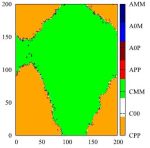EPJ B Highlight - Studying emotions causing opinions to change
- Details
- Published on 30 July 2013

Physicists can use their tools to help understand how, in real life, opinions form and change by modelling the complex interactions between information and emotion
Social phenomena fascinate with their complexity, but are not easily understood. Pawel Sobkowicz, an independent researcher based in Warsaw, Poland, has developed a model to study the dynamic of standard people, called ‘agents’, and their response to a given piece of information, depending on their emotional state. In a study just published in EPJ B, the author shows that opinion dynamics differ depending on whether the agent is agitated or not.
Key social questions of interest have been the object of previous studies using physics tools. The field of magnetic interactions has previously been used to compare opinions to a degree of freedom associated with atoms, called spin. Global average opinion is associated with overall magnetisation of the material, whereas sudden opinion shifts compare to magnetic materials phase transitions.
However, describing opinion change is not as simple as a spin flip of an atom. Therefore, unlike previous work, this study attempts to combine, on the single agent level, the complex interactions between information and emotions, albeit representing an approach still far from the actual complexity of the human psyche. Nevertheless, it allows modelling of opinion change or freezing of opinion, should the agent be subjected to an emotional response.
The premise for this study was to consider that a given agent opinion about a particular issue is determined by both its information about the issue and its subsequent emotional response. The author assumes the possibility of the same information leading to different opinions when agents are agitated. This results in an individual opinion dynamics.
The author’s findings, relevant to a simplified social environment, are directly comparable with social observations. These include the stability of minority groups surrounded by enemies and the fact that so many elections have results close to the 50/50 ratio.
P. Sobkowicz (2013), Minority persistence in agent based model using information and emotional arousal as control variables, European Physical Journal B, DOI 10.1140/epjb/e2013-40029-0




